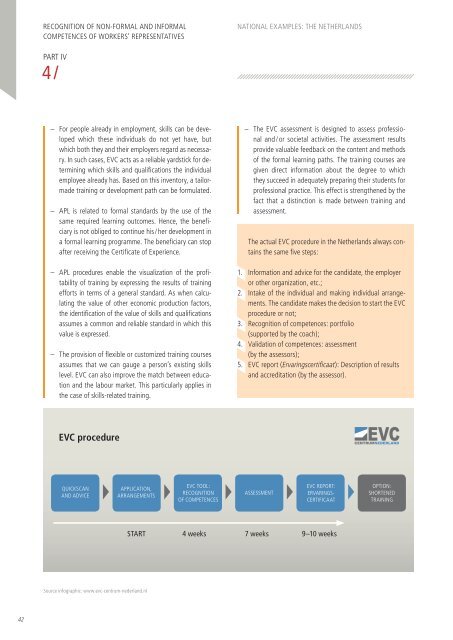RECOGNITION OF NON-FORMAL AND INFORMAL ... - Solidar
RECOGNITION OF NON-FORMAL AND INFORMAL ... - Solidar
RECOGNITION OF NON-FORMAL AND INFORMAL ... - Solidar
Create successful ePaper yourself
Turn your PDF publications into a flip-book with our unique Google optimized e-Paper software.
<strong>RECOGNITION</strong> <strong>OF</strong> <strong>NON</strong>-<strong>FORMAL</strong> <strong>AND</strong> IN<strong>FORMAL</strong><br />
COMPETENCES <strong>OF</strong> WORKERS’ REPRESENTATIVES<br />
NATIONAL EXAMPLES: THE NETHERL<strong>AND</strong>S<br />
PART IV<br />
4 /<br />
– For people already in employment, skills can be developed<br />
which these individuals do not yet have, but<br />
which both they and their employers regard as necessary.<br />
In such cases, EVC acts as a reliable yardstick for determining<br />
which skills and qualifi cations the individual<br />
employee already has. Based on this inventory, a tailormade<br />
training or development path can be formulated.<br />
– APL is related to formal standards by the use of the<br />
same required learning outcomes. Hence, the benefi -<br />
ciary is not obliged to continue his / her development in<br />
a formal learning programme. The benefi ciary can stop<br />
after receiving the Certifi cate of Experience.<br />
– APL procedures enable the visualization of the profi -<br />
tability of training by expressing the results of training<br />
efforts in terms of a general standard. As when calculating<br />
the value of other economic production factors,<br />
the identifi cation of the value of skills and qualifi cations<br />
assumes a common and reliable standard in which this<br />
value is expressed.<br />
– The provision of fl exible or customized training courses<br />
assumes that we can gauge a person’s existing skills<br />
level. EVC can also improve the match between education<br />
and the labour market. This particularly applies in<br />
the case of skills-related training.<br />
– The EVC assessment is designed to assess professional<br />
and / or societal activities. The assessment results<br />
provide valuable feedback on the content and methods<br />
of the formal learning paths. The training courses are<br />
given direct information about the degree to which<br />
they succeed in adequately preparing their students for<br />
professional practice. This effect is strengthened by the<br />
fact that a distinction is made between training and<br />
assessment.<br />
The actual EVC procedure in the Netherlands always contains<br />
the same fi ve steps:<br />
1. Information and advice for the candidate, the employer<br />
or other organization, etc.;<br />
2. Intake of the individual and making individual arrangements.<br />
The candidate makes the decision to start the EVC<br />
procedure or not;<br />
3. Recognition of competences: portfolio<br />
(supported by the coach);<br />
4. Validation of competences: assessment<br />
(by the assessors);<br />
5. EVC report (Ervaringscertifi caat): Description of results<br />
and accreditation (by the assessor).<br />
EVC procedure<br />
QUICKSCAN<br />
<strong>AND</strong> ADVICE<br />
APPLICATION,<br />
ARRANGEMENTS<br />
EVC TOOL:<br />
<strong>RECOGNITION</strong><br />
<strong>OF</strong> COMPETENCES<br />
ASSESSMENT<br />
EVC REPORT:<br />
ERVARINGS-<br />
CERTIFICAAT<br />
OPTION:<br />
SHORTENED<br />
TRAINING<br />
START 4 weeks 7 weeks 9–10 weeks<br />
Source infographic: www.evc-centrum-nederland.nl<br />
42
















